Insights from a community water workshop in Nepal
Renewable World’s Marie Hounslow attended a learning-focused community workshop. Find out what she learnt in this blog.
Renewable World has worked across Nepal to improve access to clean water as part of SolarMUSII – a project that has now installed ‘Solar-Powered Multiple Use Water Systems’ (SolarMUS) in 17 remote Nepalese communities. SolarMUS can pump water vertically up to 200m with expected lifetimes of up to 20 years, offering huge time savings to people who live far above their water sources in hard-to-reach locations. The impact is especially positive for women and girls, who would typically bear the responsibility for managing their household’s water by making several challenging trips each day.
We invited two representatives from each of the 17 beneficiary communities to attend the workshop, with at least a 50% female presence requested to ensure fair gender representation. The aim: to promote communities’ understanding of their SolarMUS to ensure they have a long-term solution to water scarcity.
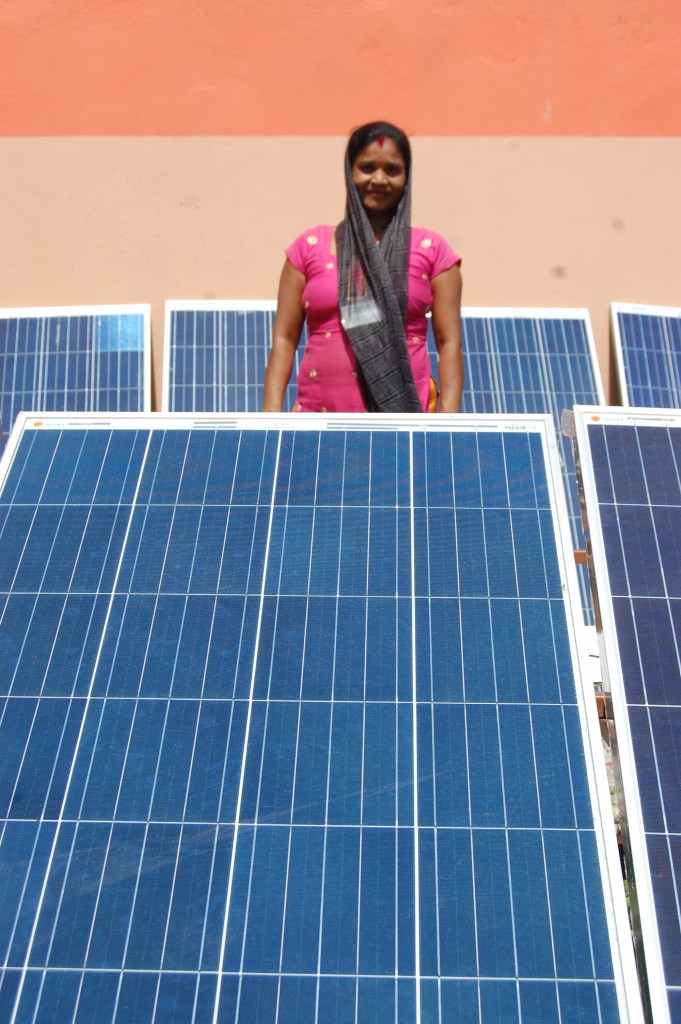
Immediately, one talking point arose from the fact only one woman, Bishna Silal, secretary of a very remote community, arrived to participate in the event. Her journey alone had taken three days, originating in the most western region of Nepal, with this trip her first outside of her district. I welcomed Bishna and commended both her bravery and commitment to her community, which shone throughout the duration of the workshop.
After the first day had concluded, Bishna laughed, “Before this training, I wouldn’t have been brave enough to talk to new people, but here I am talking to you.” She told me that she had enjoyed the financial training and thought it should be compulsory for one woman from each community to attend: “We are the main beneficiaries after all!” she exclaimed, continuing, “I have more beans, bigger cucumbers and gourds. Irrigation lets me grow different things.” The time saved from fetching and carrying water means Bishna has more time to focus on family life and income generation. She is now happier and less worried about their future – a common theme amongst the workshop attendees.
But what training helped Bishna to settle into the first day so well? What lessons can her family and community expect to learn from her when she returns? And what lessons did Renewable World learn for future projects? Below, I explain the workshop’s focus and why it’s set to create positive impacts in communities across Nepal.
Day 1: Figuring out finance
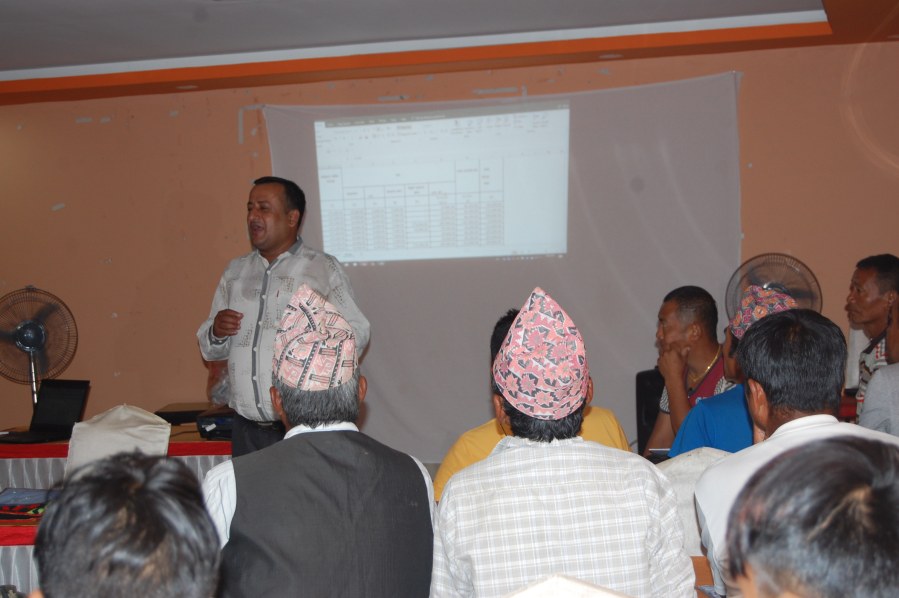
Any project manager knows that the key to a successful project lies in the numbers. This is especially true in communities that Renewable World works with: we don’t simply install SolarMUS and leave, we also provide training on how to manage the system financially. This capacity-building is essential to ensure the renewable equipment is fully enjoyed and sustainable into the long-term.
So, day one focussed on brushing up financial management skills. The community attendees divided into groups to tackle hypothetical finance scenarios, such as how much to charge water users per month to cover twenty years of maintenance costs. After various exercises, two models emerged. Either, communities would charge users more per month, i.e. over the expected 100 Nepali Rupees, or they will reduce monthly costs but supplement it with a higher annual rate to boost reserves. Overall, this exercise familiarised the participants with good financial practice and offered the group experience of how to open discussions with their own communities. Finally, the participants swapped notes and left discussing tactics for charging community members.
Day 2: Pump it
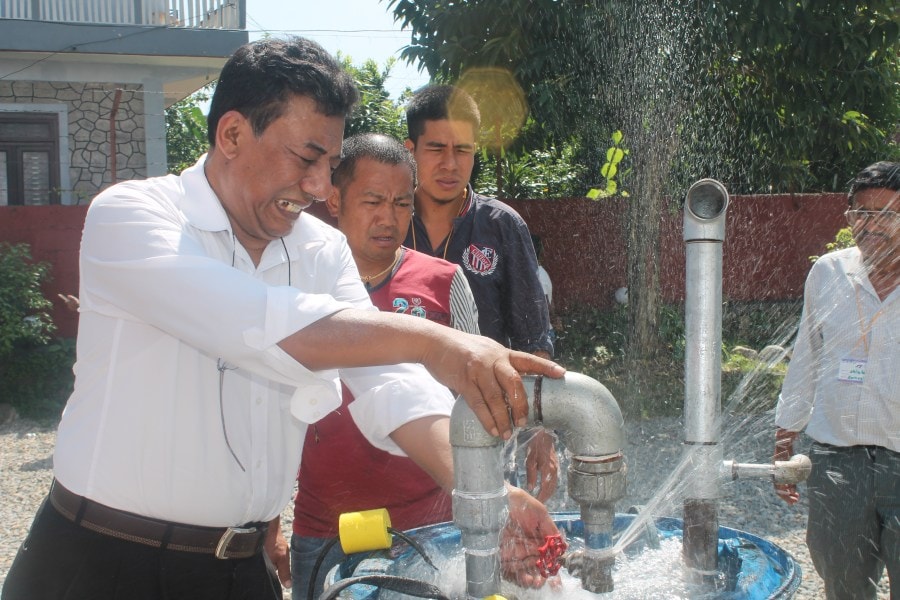
None of Renewable World’s SolarMUS projects would be complete without training on how to maintain and operate the systems. Rather than fly in renewable energy equipment from distant, overseas companies, we encourage communities to develop direct relationships with domestic solar and water pump suppliers. With the support and guidance of Renewable World’s experienced teams, the communities choose their preferred manufacturers themselves after a tendering process, in effect opening an institutional connection that they can later rely on for advanced technical assistance. Renewable World’s field teams then assist the communities to make informed decisions regarding the installation of their SolarMUS, whilst ensuring its appropriateness to meet their current and future needs.
So, day two saw the workshop welcome senior representatives from Grundfos Lorenz Pumps and Ecoprise to the workshop. Community participants enjoyed practical demonstrations, alongside assembling/disassembling sessions designed to up-skill and improve participants’ understanding of their new technology. It was a pleasure to see these Nepalese renewable energy pioneers in action, one of whom had been in business for over 30 years. Needless to say, the workshop provided an invaluable learning opportunity that would not have otherwise taken place.
Day 3: Building a pipe-dream
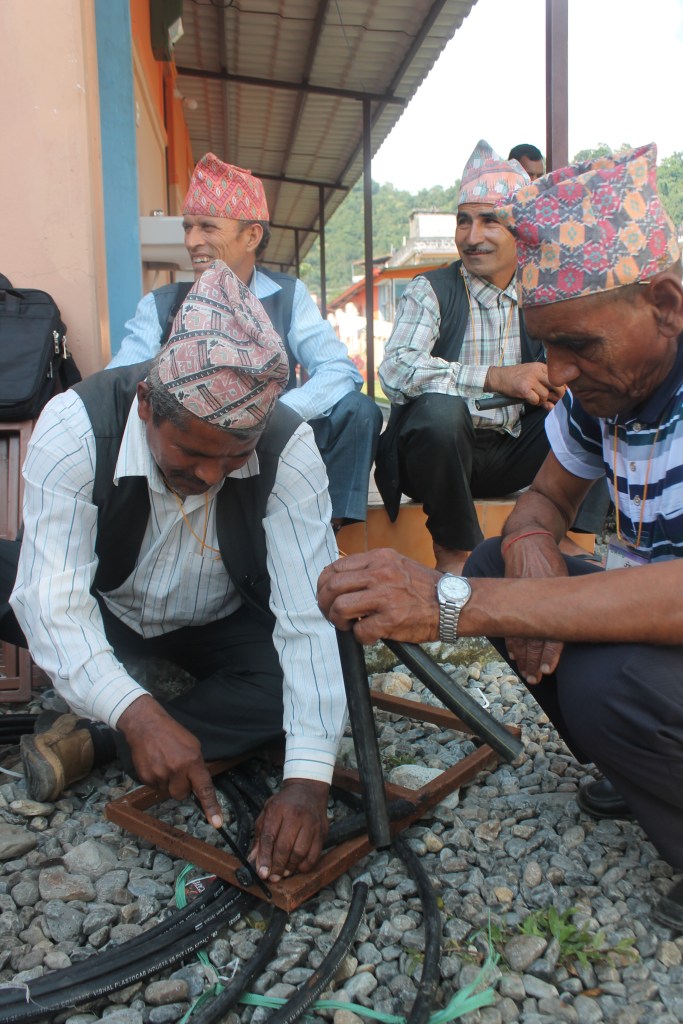
This was plumbing day and really captured the imagination of the participants. We tasked teams with building a tap-stand (water collection point) from scratch. “The idea is to equip the communities with knowledge that can speed up the maintenance process. Our communities are so remote that waiting for repairs can take up to a week” explained Baburam Paudel, Global Technical Manager for Renewable World, “with simple knowledge, a set of basic tools and some standard spare parts, the Operator within the community can potentially repair within hours rather than waiting for days.”
In a bid to encourage some healthy competition between the participants, Ganga, one of Renewable World’s seasoned Project Officers, declared: “Nobody is leaving until every team has constructed a tap stand!” – which sparked a frenzy of feverish activity. The team-building game pitched district against district, with energy levels so high that the exercise even drew a crowd from the neighbouring buildings. The groups thrived under the pressure and learnt the art of building tap stands, offering a useful glimpse into their repairing proficiency in future. Overall, the benefits of the workshop were clearly visible: the competition’s real prize wasn’t just the bragging rights of the workshop, but practical know-how that could be relied upon when the communities needed.
Day 4: A field finale
Our final day comprised a field visit to the Bhaitari Community – a group with huge enthusiasm for SolarMUS. We listened to the Chair of the Water User Committee who shared comments on the process and the community’s unique approach. In fact, the community had been so eager to install the SolarMUS that each contributor had raised over three times the required amount to expedite the project. This meant they could take full advantage of Renewable World’s extensive support, research and project experience to begin commissioning in just five months! Once we began speaking with the community members, we soon understood the root of their enthusiasm.
We met with the community’s designated ‘Pump Operator’, who quickly explained the life-changing impact that the pump had had on her life. Prior to the pump’s installation, she’d need to collect water for 20 minutes a day, eight or nine times, just to provide enough water for herself and her family. Now, a tap stand feeds water directly into her home, eliminating the need for her labour and freeing time for more productive tasks. Even the community’s informal ‘Mother’s Meeting’ can now be held in the family’s home and garden, rather than its original location near the community water source.
After speaking with other community members about the transformative effect of SolarMUS, we sat down to eat a late lunch and evaluate the training course. We then swapped contact details and bid fond farewells. I was humbled to hear that some of the participants had a four-day journey ahead of them to reach their homes and loved ones. On reflection, the long journeys many faced to and from the workshop revealed the value that the communities perceived in their new water pumps, as well as how eager they were to ensure their long-term success.
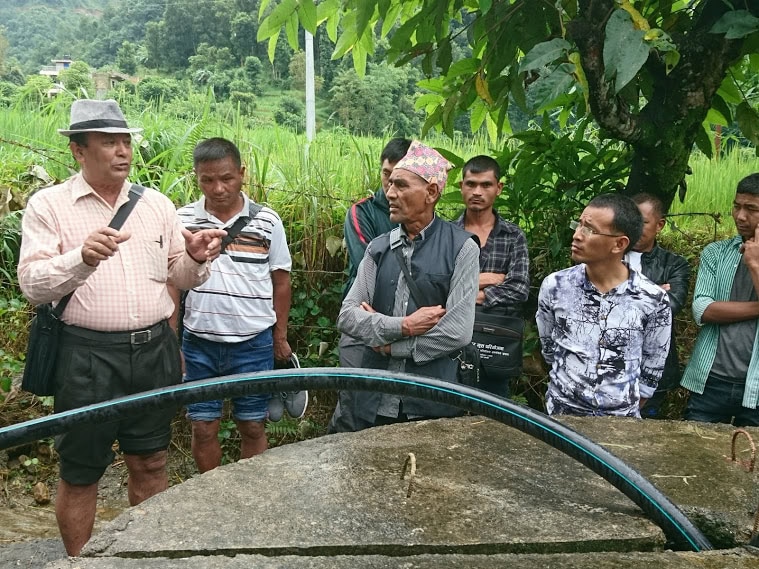
Overall
So, what have we learnt? Well, that bringing our communities together is extremely worthwhile and that learning from each other is more compelling and interesting than learning from anybody else. That there is still some work to do to ensure that women are truly equal partners in the project, which should be factored into multiple levels of future projects. That if technical training was more advanced it might even spur on the community members to fill the shortage of solar engineers and plumbers in Nepal. Finally, I learnt that our bespoke approach, working in partnership with the commercial supply chain – not undermining it – is the only sustainable way forward.
On a personal note, a huge thank you to each and every person I met. Your warmth and generosity of spirit was so uplifting and motivates me to work harder so we can bring access to clean water to many more people in Nepal and beyond. I bid you all the very best in future.
Marie Hounslow, Renewable World’s Head of Fundraising